How to Stew Beef to Make It Tender
There is not one but several types of offcuts you can buy to avoid bumping into a chewy stew! Yes, the fillet mignon, Wagyu, or even Jamon Iberico, but would that be the way you want to always go to have tenderness in your beef stew meat? Certainly not! – besides, the best cuts for stews happen to be among the toughest. Today, I am going to share a few secrets on how to tenderize beef stew meat and make a million-dollar stew from some of the cheapest rumps you can come by.
7 Best Meat Tenderizers You May Check.
| Photo | Title | Buy |
|---|---|---|
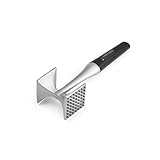 | Farberware 5211475 Professional Dual-Sided Stainless Steel Meat Tenderizer with Comfort Grip Handle, Standard |  |
 | K BASIX Meat Tenderizer Hammer Tool, Rust Proof Meat Hammer, Heavy Duty Meat Pounder, Comfort Grip Handle, Dual Sided Meat Mallet for Flatten & Pound Beef Veal Lamb Chicken Steak, Dishwasher Safe |  |
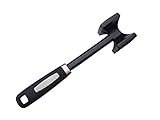 | Checkered Chef Meat Tenderizer Hammer - Dishwasher Safe Metal Kitchen Mallet for Tenderizing Chicken, Beef, Pork & Nuts with Non-Slip Grip |  |
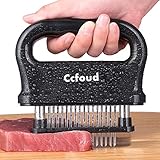 | Meat Tenderizer, 48 Stainless Steel Ultra Sharp Needle Blade Tenderizer for Tenderizing Steak, Beef with Cleaning Brush,Durable Baking Kitchen Accessories by Ccfoud |  |
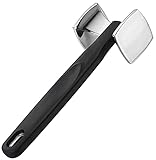 | Spring Chef - Meat Tenderizer, Heavy Duty Hammer Mallet Tool and Chicken Pounder, Solid Aluminum Construction with Chrome Plating, Soft Grip Handle, Black |  |
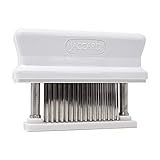 | Jaccard 48-Blade Meat Tenderizer, Original Super 3 Meat Tenderizer, 1.50 x 4.00 x 5.75 Inches, White |  |
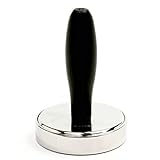 | Norpro Grip-EZ Stainless Steel Meat Pounder |  |
Every chef is accustomed to their methods of tenderizing beef stew, though I will share those that I've tried and borne results. These methods are not restricted to beef; you can apply them to goat, pork, lamb, buffalo, etc.
Related Topic:
- Best meat tenderizer reviews and buying guide.
- Best meat smoker thermometer reviews and buying guide.
Methods of Tenderizing Beef Stew Meat
Below are the most effective methods you can apply to transform tough and fibrous collagen fibers into tender and tastier bites for your stew. If you have tried others with impressive results, you're welcome to add them to this list.
1. Pound the Meat
This is possibly the earliest method of tenderizing meat, but still one of the most effective. You can pound the meat with a meat mallet, or put the steak in a saran wrap and give it a beating with a rolling pin or a skillet. This breaks down the meat fibers that make chuck tough.
You should avoid bones in the piece of meat you want to pound. The meat will cook tender and sumptuous.
2. Cook it low and for long
More often than not, cooking the majority of the cuts requires low heat for a considerably long cooking period. The collagen fibers present in muscular cuts are responsible for the chewy nature of such meats if they're not properly cooked.
With little heat (160 – 205 F) and a lot of time (3 -4 hours) in a small amount of liquid, breaks down the tough collagen fibers. The resultant soft meat has a higher digestibility and bioavailability. What more would you ask of a delicious stew?
A slow cooker would be the easiest appliance to use here although you can still sear the meat in a skillet. Just ensure the heat is relatively low and you cook the meat for not less than three hours.
Did you know that pre-boiling tough and fibrous cuts of beef can make it tender and juicier for the stew? You can actually do this in the slow cooker with a little amount of liquid. Just like you'd do when braising, avoid using water. Go for beef stock or beef broth. Should you need a more detailed flavor, both veal stock and bouillon paste will sort you out.
3. Searing
Want to do some kitchen trick? Try this one that gets things better than you may expect. By giving your meat an initial high heat cook (searing) you essentially lock in the moisture. This moisture aids in achieving tenderness as well as flavor.
Think of this- most cooks would normally add the meat into the cooking liquid and then leave everything else to the cooker. This results in a one-dimensional flavor in the stew, as well as gray meat. To avoid that (as well as make the meat tender) sear it over high heat and you'll have attractively brown and tender cube gracing your stew.
When searing, go for heat-tolerant oils such as canola and grape seed oil. Ensure the pan is not smoking, and sear a few pieces at a time. If you lack the time, just sear a big hunk of meat before cutting it up.
4. Marinating
Marinating covers the dual purpose of tenderizing and flavoring the meat. If you marinate n the appropriate ingredients for at least two hours, you should expect a big change. Where possible let the meat rest in the marinade overnight but drain off all the liquid before commencing searing.
Below are some common but effective ingredients that will turn the tough connective tissue into soft and delicious beef stew meat.
- Fruit enzymes
- Kiwi fruit is the most effective of all, containing actinidin, an enzyme that's gentle but flavorless. Soaking an upper shoulder cut in a kiwi fruit marinade for 12 hours is all you need. Your stew will be beckoning at you.
- Another fruit you can find just about anywhere is a pineapple. Masked within the sweet juice, is the enzyme bromelain. If not careful with a pineapple marinade, you could have the most fibrous cuts reduced to mush.
- Papaya contains the enzyme papain. Just like most enzymes above, papain acts on the proteins that build up the collagen fibers. The connective tissue structure is usually decimated within a few hours.
- Some other fruits you can use include fig, Asian pear, and mango.
The rule with the fruits is that you should have not more than two tablespoons of the crushed fruit, for a cup of marinade. As mentioned earlier, the longer you marinate in fruit enzymes, the more you risk turning the meat into mush. And by the way, you can use mango or pineapple juice.
One last thing about the fruits is that you should keep the temperature between 50 – 70 C. This is the optimum temperature for enzymatic action.
- Advantages of pellet smokers
Baking soda is alkaline in nature and would thus alkalize the meat surface where it's applied on. This process hampers the protein bonds, allowing for tenderness to set in.
To tenderize your stew, beef this way, you are supposed to coat the meat surface with a tablespoonful of baking soda or soak the meat in a water-baking soda solution. Leave the meat for around 20 minutes and then rinse thoroughly. If you intend to brown the meat, just don't forget to dry it first.
Baking soda leaves an alkaline taste in the meat, which is why you should not invest in this method for costlier cuts.
- Salt
As unlikely as it may sound, the table salt in your kitchen is a good meat tenderizer in disguise. Rubbing a roast in salt and refrigerating for 24 hours prior to cooking is all you need to forget about meat tenderizers. Of course, you won't be making your stew with whole roasts- steaks and other smaller cuts require just 40 minutes.
Remember to wash off the salt before cooking.
- Acidic marinade
They didn't tell you that marinades not only enhance the flavoring but also tenderizes the meat, but how? Marinades contain acids which are the only tenderizing agents. This means that since acids take long to penetrate, the presence of other ingredients in the marinade slows everything down. You should know when to apply this method.
Should you go ahead with this method, you should make a straight acid mix, otherwise, you can include oil in your marinade and refrigerate for 24 hours.
The best and readily available acids you can include in the marinade include;
- lemon/lime juice
- vinegar
- wine/beer
- yogurt/buttermilk
- tomato/teriyaki/soy sauce
You May Like:
- How to tenderize meat without mallet
How long should you boil beef stew meat for tenderness?
The above discussion has been biased towards certain cuts- the chucks. For the same reason that these cuts are unsuitable for grilling, they are the ideal choice for stew. This is because they contain lots of collagen fiber which when broken down, give the stew an extra tender flavor. Let's now address the most common method of tenderizing meat from other parts that are good for stews.
a. Blade steak
This is essentially the shoulder blade. These cuts demand that you simmer for an hour and a half after the mixture has come to a boil. If you're using a precision pressure cooker, let it boil for 15 minutes.
b. Pectoral brisket
In simpler terms, this is the chest. This cut can make you the best stew that you've ever had if you only boil it for at least 3 hours. You could cut down that time to barely 80 minutes with a pressure cooker
More Relevant Topic:
- Best meat slicer reviews and buying guide.
- How to clean a meat tenderizer.
How to Choose Beef Stew Meat?
You are now unbeatable when it comes to tenderizing whichever cut that comes your way. With that, it would be good to learn to select the best parts for your stew. So what should you look for?
Stew meat ideally comes from the tougher and larger muscular parts of the animal. The best cut for a beef stew would be the large shoulder of the bull. This part is commonly known as the chuck.
You should be careful when buying meat as some butchers will package a mixture of small pieces left over after cutting the bigger parts. This would result in inconsistency when cooking. You should therefore insist on the chuck for a uniform texture and sweet stew. You can also use the roast, top, bottom, steak, and round cuts for your stew. Just stick to one cut for every pot.
Conclusion
Tenderizing your beef stew meat is no longer a tough task for you, thanks to the tips I shared today. You have the freedom of experimenting with any cut without risking ending up with chewy pieces of meat in your stew. When preparing the cuts, just remember to avoid the extremely lean parts, and ensure the texture and marbling are consistent throughout the meat.
Rita C. Donnell (Jennifer) has spent the last 26 years studying and practicing nutrition science. She has used a larger part of this time in improving people's livelihoods. She has done so by coming up with unquestionable ideas on how to tackle food problems in her community. Readmore
Source: https://kitchenfact.com/how-to-tenderize-beef-stew-meat/
0 Response to "How to Stew Beef to Make It Tender"
Post a Comment